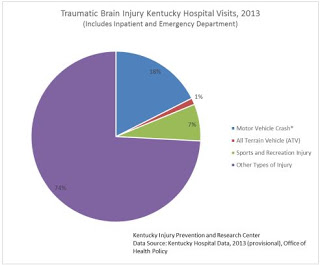Health News
- How To Keep Kids Safe From Traumatic Brain Injuries This Summer
About 1.7 million people in the U.S. suffer a traumatic brain injury each year, and nearly half a million children under 15 visit an emergency room for TBI. A brain injury is traumatic if it disrupts the normal function of the brain. Dr. Michael Egnor,...
- Concussions: More Than A Knock On The Head
Two or more athletes collide on a football field. One hits the ground hard suffering a head impact. The athlete gets up, shakes it off and continues to play. Not always the wise thing to do. ?I often say that football is not a contact sport, it is a collision...
- Keeping Your Head: The Most Dangerous Games
by Mark Huslage, LCSW-C, CBIST Coordinator of Brain Injury Programs, LifeBridge Health As stories like this show us, emergency room visits are rising for concussions among student athletes. While we often focus on the risks of football, that's only...
- Kevin Crutchfield, M.d., Named To Nfl Committee
Kevin Crutchfield, M.D., director of the Comprehensive Sports Concussion Program at the Sandra and Malcolm Berman Brain & Spine Institute of LifeBridge Health, has been appointed to the National Football League Players Association Concussion and...
- Sports-related Concussions Pose Serious Risk
by Kevin E. Crutchfield, M.D., Director, Comprehensive Sports Concussion Program, Sandra and Malcolm Berman Brain & Spine Institute With the school sports season gearing up, remember that sports-related concussions are a risk for athletes. Concussion...
Health News
Centers for Disease Control working to find ways to prevent traumatic brain injury; affects one in five Kentucky households
The federal Centers for Disease Control and Prevention is using a public-health approach to find strategies to prevent traumatic brain injuries and reduce the physical, psychological, economic and social impacts they cause.
Traumatic brain injuries are those that happen because of a blow or jolt to the head, like a fall or a motor vehicle accident. It contributes to 30 percent of all injury deaths in the U.S., killing 138 people every day, according to the CDC.
Nationwide, the most common cause of brain injury is falls, but in Kentucky, most brain injuries and brain-injury-related deaths are caused by traffic accidents. About 5 percent of Kentucky's population has a brain injury, which is double the nation-wide rate, affecting one if five Kentucky households, according to the Brain Injury Alliance of Kentucky.
Survivors of serious brain injuries have a range of disabilities, from memory issues, personality changes to debilitating physical disabilities, having a lasting effect on families and communities.
In partnership with the traumatic brain injury and rehabilitation communities, the CDC, using research, is working to meet these goals and results of this research can be found in a special issue of the Journal of Head Trauma Rehabilitation.
One article looks at the problems of unemployment after traumatic brain injury, with data showing that 60 percent of patients who received inpatient rehabilitation for TBI are still unemployed after two years of discharge -- and 35 percent of those who were employed two years after injury were employed only part-time. In Kentucky, 45 percent of those with brain injury reported a loss of employment or educational opportunity because of their injury.
 Another article focuses on motorcycle crashes as a cause of TBI and says, "People injured in motorcycle crashes use more health-care resources and are three times more likely to die in the emergency department, compared to those with other causes of TBI." Kentucky had 6,552 hospital visits in 2013 for TBI caused by motor vehicle crash and of these 419 were motorcycle related, according to the Brain Injury Alliance. Kentucky no longer has a law requiring motorcyclists to wear helmets.
Another article focuses on motorcycle crashes as a cause of TBI and says, "People injured in motorcycle crashes use more health-care resources and are three times more likely to die in the emergency department, compared to those with other causes of TBI." Kentucky had 6,552 hospital visits in 2013 for TBI caused by motor vehicle crash and of these 419 were motorcycle related, according to the Brain Injury Alliance. Kentucky no longer has a law requiring motorcyclists to wear helmets.
Other articles look at the high impact of sports- and recreation-related TBIs, reporting that "About 7 percent of all emergency department visits for sports- and recreation-related injuries are TBIs, with at least 3.4 million sports- and recreation-related TBI emergency department visits occurring over a 12-year study period." Kentucky hospitals had 2,600 TBIs in 2013 related to sports and recreation injury, according to the alliance.
 |
| Image: brainline.org |
Nationwide, the most common cause of brain injury is falls, but in Kentucky, most brain injuries and brain-injury-related deaths are caused by traffic accidents. About 5 percent of Kentucky's population has a brain injury, which is double the nation-wide rate, affecting one if five Kentucky households, according to the Brain Injury Alliance of Kentucky.
Survivors of serious brain injuries have a range of disabilities, from memory issues, personality changes to debilitating physical disabilities, having a lasting effect on families and communities.
In partnership with the traumatic brain injury and rehabilitation communities, the CDC, using research, is working to meet these goals and results of this research can be found in a special issue of the Journal of Head Trauma Rehabilitation.
One article looks at the problems of unemployment after traumatic brain injury, with data showing that 60 percent of patients who received inpatient rehabilitation for TBI are still unemployed after two years of discharge -- and 35 percent of those who were employed two years after injury were employed only part-time. In Kentucky, 45 percent of those with brain injury reported a loss of employment or educational opportunity because of their injury.
Other articles look at the high impact of sports- and recreation-related TBIs, reporting that "About 7 percent of all emergency department visits for sports- and recreation-related injuries are TBIs, with at least 3.4 million sports- and recreation-related TBI emergency department visits occurring over a 12-year study period." Kentucky hospitals had 2,600 TBIs in 2013 related to sports and recreation injury, according to the alliance.
- How To Keep Kids Safe From Traumatic Brain Injuries This Summer
About 1.7 million people in the U.S. suffer a traumatic brain injury each year, and nearly half a million children under 15 visit an emergency room for TBI. A brain injury is traumatic if it disrupts the normal function of the brain. Dr. Michael Egnor,...
- Concussions: More Than A Knock On The Head
Two or more athletes collide on a football field. One hits the ground hard suffering a head impact. The athlete gets up, shakes it off and continues to play. Not always the wise thing to do. ?I often say that football is not a contact sport, it is a collision...
- Keeping Your Head: The Most Dangerous Games
by Mark Huslage, LCSW-C, CBIST Coordinator of Brain Injury Programs, LifeBridge Health As stories like this show us, emergency room visits are rising for concussions among student athletes. While we often focus on the risks of football, that's only...
- Kevin Crutchfield, M.d., Named To Nfl Committee
Kevin Crutchfield, M.D., director of the Comprehensive Sports Concussion Program at the Sandra and Malcolm Berman Brain & Spine Institute of LifeBridge Health, has been appointed to the National Football League Players Association Concussion and...
- Sports-related Concussions Pose Serious Risk
by Kevin E. Crutchfield, M.D., Director, Comprehensive Sports Concussion Program, Sandra and Malcolm Berman Brain & Spine Institute With the school sports season gearing up, remember that sports-related concussions are a risk for athletes. Concussion...
